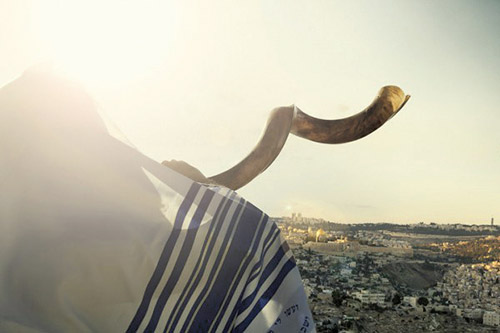
As residents of Bergen County and its environs, we are blessed with a myriad of opportunities to recharge our spiritual batteries prior to all of the chagim. Particularly numerous are the pre-Rosh Hashanah offerings around town. This season took us to three very inspiring programs leading up to Tishrei.
On Tuesday evening, September 12, Yeshiva University’s Center for Israel Studies joined forces with the Sephardic Community Program under the directorship of Rabbi Moshe Tessone, the Sephardic Studies Program and the Belz School of Music, in presenting “Elul: An Evening of Sephardic Music.” The program, introduced by Professor Ronnie Perelis of Teaneck who leads the graduate studies program in Judeo Spanish history and literature, celebrated the rich music and spirituality of Sephardic piyut.
Rabbi Moshe Tessone, an accomplished chazan and musician in addition to spearheading Sephardic programming for communities across the U.S., Latin America and Europe, was joined by Cantor Mark Hazzan and famed guitarist Avram Pengas for a delightful evening of song and prayer. Tessone explored the origins of piyut during the rabbinic period when poets wrote liturgy for the Middle East, Spain and even Ashkenaz. Basically, groups of poets gathered together nighttimes to share wine and improvise poetry dealing with heartache and death, sunset and stars, and any topics dealt with in secular poetry. To these lyrics they added allusions and phrases from Jewish texts. The next morning, they presented these “piyutim” to the local chazanim, who incorporated them into the tefillot and then spread them from country to country. Throughout the evening we were treated to melodies from across the Sephardic world, from Syria to Morocco, including Moorish and Ladino melodies, accompanied by the distinctive sounds of the Ud. An exotic and spiritually uplifting experience was shared by all—in addition to tasty kuba and Moroccan cigars.
Prior to the first Selichot on Saturday night, September 16, Rabbi Larry Rothwachs, mara d’atra of Congregation Beth Aaron, led his congregants and community members in a pre-Selichot kumzitz. Rabbi Rothwachs, revered for his sagacious and sensitive divrei Torah, is, as well, a talented musician. Crediting his mother, Mrs. Laurette Rothwachs, who was in attendance, for the two piano lessons she forced him to undergo, he proceeded to present 14 selections from the liturgy of the Yomim Tovim. Accompanied by Ari Mandelbaum of “Y-Studs A Capella” and Meir Kreitman, lead guitarist of “Kol Mevakesh,” plus the surprise accompaniment on guitar of Rabbi Rothwach’s friend Gili Houpt from Yerushalayim, Rabbi Rothwachs offered meaningful introductions to each.
Prior to the lilting rendition of “Kechu imachem devarim v’shuvu el Hashem—Take with you things and return to Hashem,” Rabbi Rothwachs queried, “What are the things that are appropriate for us to take on our journey to teshuva?” As we know, the traditional linen garments in which we are laid to rest have no pockets intentionally, for we are not expected to take things with us to the next world. Rabbi Rothwachs posited that what we take with us as we approach Hashem during these days of teshuva are things we can take into the next world such as mitzvot and zechuyot earned through our actions and the actions of our descendents. Much inspired singing and swaying was evident throughout the enjoyable evening.
Rabbi Paysach Krohn, renowned mohel and magid, addressed a large audience at Congregation Beth Abraham on the evening of September 17. The program, sponsored by the Feigenbaum and Finkelstein families and introduced by Rabbi Yaakov Neuburger, mara d’atra of Beth Abraham, was promoted as an opportunity to help us open up our hearts in preparation for the Yomim Noraim. Rabbi Krohn opened the program by assuring us that after his presentation, our tefillot will not be the same. The first powerful suggestion to the audience was that they each daven in their own siddur/machzor so that they can underline and make notations on phrases that have heightened meaning and significance for them on a personal level.
In citing a story recounted by Rav Shulsinger as told to him by the Slobodker Rebbe, a critically ill man came to the Rebbe after as dire diagnosis. The Rebbe uplifted him by referring to the tefillah “V’na al tatzricheinu l’yedei matnat basar v’dam,” do not make us beholden to the gifts of flesh and blood. For this critically ill man, the tefillah held the special significance that he should not be beholden to gifts of flesh, such as lung and kidney transplants, or blood, such as transfusions and dialysis.
In explication of the connection made between two chagim with very different meanings and celebrations, Rabbi Krohn presented us with a most uplifting link between Yom Hakippurim and Chag Purim. Many times throughout the Yom Kippur liturgy we recite the phrase “U’vechen, and therefore,” such as in “U’vechen ten pachdecha, and therefore give Your fearsomeness,” or “U’vechen tzadikim yi’rau, and therefore righteous men will be fearful.” In Megillat Esther, the phrase “u’vechen” is used after Esther arranges for her people to fast and pray in advance of her approaching the king unannounced. At that point, Esther had complete faith that the king would respond favorably to her request to save her people from destruction at the hands of the wicked Haman. So too, by using the same phrase, “u’vechen,” we are urged to be positive and optimistic as we approach Hashem during the Days of Awe.
Chodesh Tishrei abounds with opportunities for increased inspiration here in Bergen County. Let’s hope we avail ourselves of as many as possible.
K’tiva v’chatima tova!
By Pearl Markovitz










